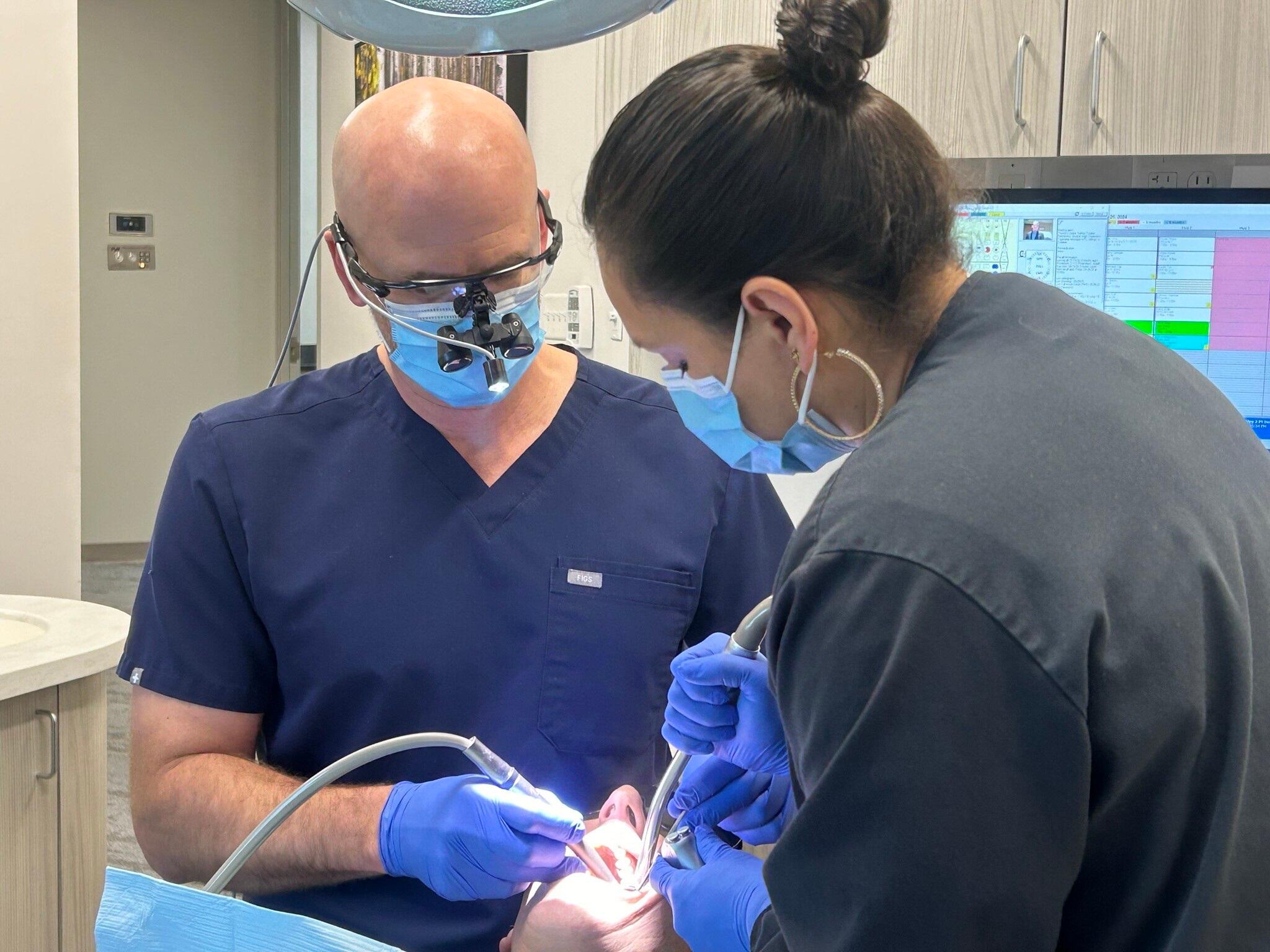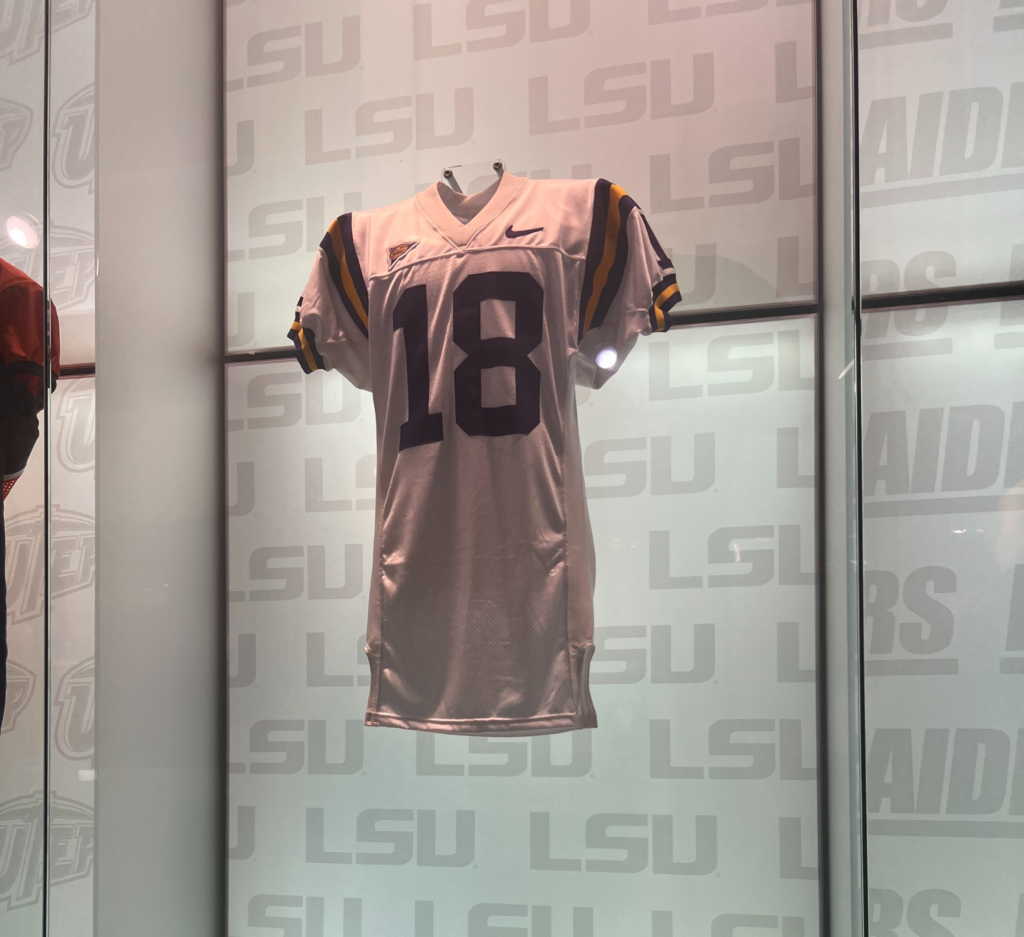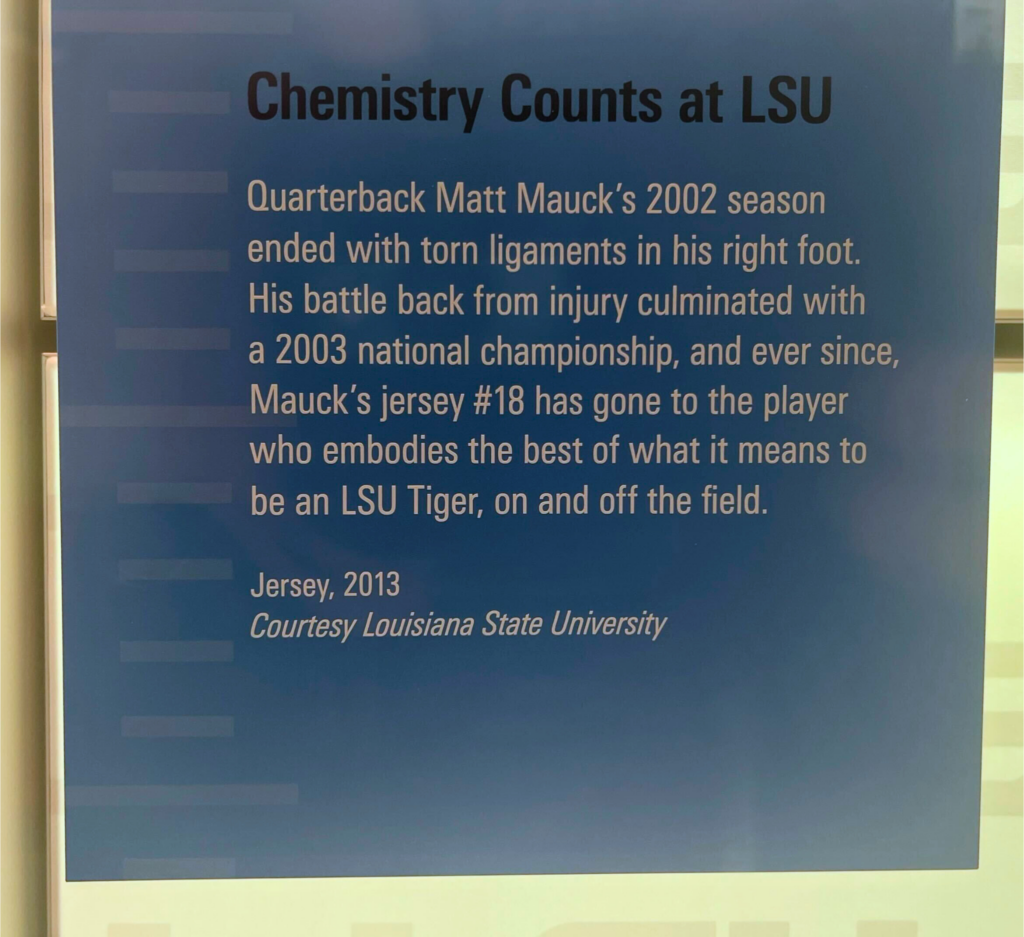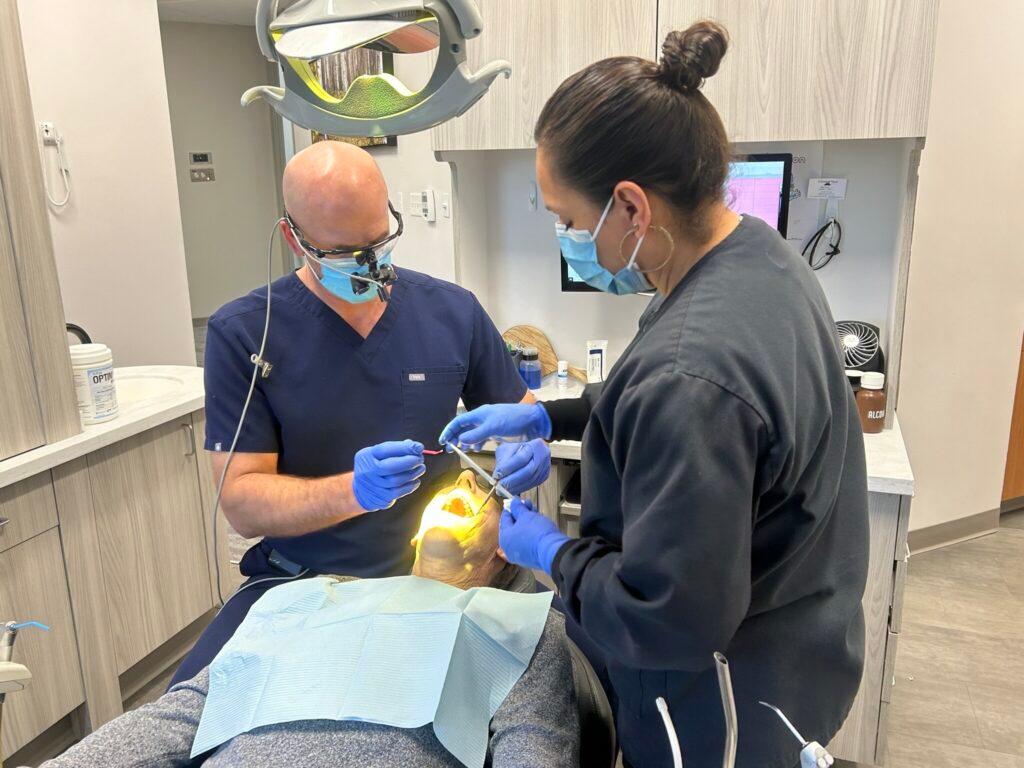
After running two-minute drills as a quarterback, Matt Mauck is now running a different type of drill as a dentist in Aurora. He has practiced dentistry for 11 years in Colorado.
After Mauck graduated from Louisiana State University with a degree in kinesiology, he had three options: stay for his senior year, go pro, or go into dental school. His mind was set on going to dental school until the Denver Broncos drafted him with the 225th overall pick in the 7th round. It was something that was unexpected.
“You know up until that year, I was a good player, but nobody thought I was going to be drafted and ended up having a great year,” Mauck said. “I actually got married that off-season and because I didn't think I was going to get drafted. “It was scheduled the same weekend as the combine. So, if that tells you anything about what I thought my future was.”
Mauck felt he had an unbelievable training camp. But, when it came to the Pro Hall of Fame game against the Washington Redskins, he threw two interceptions. It was tough. He spent two more seasons with the Tennessee Titans before a back injury ended his career.
“I think I could have come back. But I kind of saw the writing on the wall,” Mauck said. “For me, it was fortunate to have something to fall back on. And so, I kind of wanted to start dental school and get my life going.”
Mauch was accepted into three schools: LSU, the University of Colorado, and the University of Washington. He chose to attend CU School of Dental Medicine. The Jacksonville Jaguars, Atlanta Falcons, and Cincinnati Bengals contacted him during his first week of dental school. But, his mind was already made up. He now practices at Better Your Smiles in Aurora.
Reflecting on his LSU legacy and legendary coach Nick Saban
Mauck was the quarterback who gave legendary coach Nick Saban his first national championship with LSU in 2003. The Tigers defeated heavily favored Oklahoma in the 2004 Nokia Sugar Bowl for the BCS National Championship.
Saban shocked the college football world when he announced his retirement earlier this year. Saban spent 28 seasons on the collegiate level as a head coach at Toledo, Michigan State, LSU, and Alabama. The Bill Belichick disciple also had a brief stint as head coach of the Miami Dolphins. He won seven national titles.
“My first thought was that I was sad about college football. Because I think college football is better when Nick Saban is involved in it,” Mauck said. “My next thought was, I wasn't surprised. I think the way he coaches and the respect he commands, the way the transfer portal and NIL was going, I don't think that's the college football he wanted to be a part of.”
Mauck’s relationship with Saban dates back to his days in high school in Indiana. Born in Evansville and raised in Jasper, he was a two-sport star at Jasper High School. He led the Wildcats baseball team to back-to-back state titles in 1996 and 1997 as a pitcher, centerfielder, and third baseman. On the gridiron, Mauck helped the team to the state championship game as a quarterback and defensive back in 1995. Mauck’s first love had always been football.
“Basketball is every boy's first love in Indiana, but I always kind of thought my future was probably best for football,” Mauck said.
Which sport to play?
Mauck wasn’t highly recruited for football coming out of high school. He received offers from Northwestern, Indiana, Purdue, Ball State, and a couple small schools mostly for baseball. He attributes that to his high school football team running an option-style offense.
His talent on the diamond earned him the attention of baseball scouts. He was drafted by the Chicago Cubs in the 6th round of the 1997 MLB Draft. Despite his love for football, he called Saban about his decision to pursue a professional baseball career.
“I basically had that conversation with Coach Saban, ‘Hey, I'm going to go play baseball.’ He was super supportive,” Mauck said. “And I think that's the one thing about Coach Saban that some people, you kind of get to see the clips of him blowing up on the sideline and grabbing his butt and screaming at people. He has a very big heart when it comes to things that if it's going to be better for that person, he is a big supporter of that.”
Mauck would spend four seasons in the minors without getting a call to the Majors. He spent two seasons with the AZ Cubs in the Rookie League and two more with the Lansing Lugnuts in Single-A. The Lugnuts played not far away from the Michigan State campus when Saban was the coach. It was vital in keeping their relationship intact.
When Mauck decided he wanted to go back to football, he called Saban. But, Saban had accepted the head coaching job at Louisiana State University. Mauck was still offered a scholarship on the team.
“I was very nervous when he left Michigan State to go to LSU because that’s right when I had decided that I was going to quit baseball and I was worried that commitment was good at Michigan State, but it wasn't going to be good at LSU,” Mauck said. “So, that's kind of what I did and said, “Hey coach, I'm leaving baseball. LSU is a place I maybe want to go to. He flew me down.”
The Southeastern Conference (SEC) atmosphere was a culture shock for Mauck, who grew up in the Big Ten region.
“Just the South is different, wonderful and great. But if you're not used to it, I think I went June 20th, so it was like 95 degrees, 90 percent humidity. You step off the plane, it feels like someone smacked you in the face,” Mauck said. “You step on campus and you've never taken a snap, never played, and almost the whole community knows who you are. People live and breathe it.”
After redshirting his freshman year, Mauck made three appearances in his first year playing for the Tigers. None were bigger than the third game in the 2001 SEC Championship game against Tennessee. Mauck came in for quarterback Rohan Davey was injured. He rushed for 43 yards and two touchdowns in the fourth quarter to beat the Vols, 31-21. He was named the game’s MVP.
“Nothing can prepare you for that, but I think some of my experiences, my time in minor league baseball, you just appreciated things more, a little more life experience,” Mauck said. “And so. I think it helped me and that the moment wasn't too big and I was able to understand that you can't control the outcome. You just got to control the one play that you're doing right now.”
Mauck credits that game in helping LSU return to national prominence and retaining in-state recruits.
“It helped us to recruit because in the past LSU would lose in Colorado, Kordell Stewart is from New Orleans, Marshall Falk is from New Orleans. All these people would leave the state and that game pretty much closed the borders and pretty much said, “Alright if you're a great high school football player, you're not going anywhere else. You’re coming to LSU.”,” Mauck said.


His sophomore season in 2002 started off with a lot of promise with a 5-1 record. In the fourth quarter of a win against Florida, Mauck would suffer a season-ending Lisfranc fracture on his foot. Mauck, who was considered a running quarterback, used the time away to work on his passing.
“I spent the rest of the season sitting on an ice cooler and I would have one of the equipment guys stand about 15, 20 yards and I would just take a bucket of balls and just sit and throw over and over and over. I probably threw five to 600 passes each practice. I had nothing else to do. I was bored. But, it made me a way better passer than what I was prior to that,” Mauck said.
The Tigers would finish the season with a disappointing 8-5 record. But, the 2003 season is where everything clicked for Mauck and the Bayou Bengals. LSU beat everyone except Florida in the regular season. The team went on to beat Georgia in the SEC Championship game. Because of that one loss to Florida, there was a three-way tie between LSU, USC, and Oklahoma to determine who will play in the Sugar Bowl for the BCS National Championship.
“We kind of felt like we had the strongest case to get there beating Georgia in the SEC Championship game. So really, we kind of felt like USC or Oklahoma was the one that was going to be pushed out. We were going to be #2 no matter what,” Mauck said.
LSU was chosen to play against Oklahoma, who lost in the Big 12 Conference Championship Game to Kansas State. Despite being a bad game for Mauck, the LSU defeated the Sooners, 21-14. Mauck finished the season leading the SEC in pass efficiency (even better than Ole Miss and future New York Giants quarterback Eli Manning, who the #1 overall pick of the 2004 Draft), He would forgo his senior year and enter the NFL Draft.
“Obviously that game featured the #1 and 2 defenses in the country, us and Oklahoma. So it wasn't surprising that it wasn't the best offensive game of the year. But yeah, I think the hardest part is all the distractions, all the media during the game,” Mauck said.
The changing landscape of college football
Now, Mauck is married and a father of three sons, Tyson, Kelly, and Olly. His oldest son, Tyson, has signed a Letter of Intent to play football at NCAA Division II powerhouse Colorado School of Mines after a stellar career at Cherry Creek High School. The Orediggers are coming off back-to-back appearances in the NCAA Division II National Championship game.
The landscape of college football has changed drastically since his playing days. The transfer portal is a highway where athletes can move freely from school to school without sitting out a year. Deals for name, image, and likeness allows athletes to earn up to possibly millions of dollars.
Mauck agrees that students should be paid. But, he doesn’t like the current process.
“I think that it should go to the university and then be dispersed amongst the kids. I think you're just creating a bad environment when certain kids get singled out and one kid's making a couple million dollars and another kid can't go to McDonald's,” Mauck said. “So, I don't like the way it's handled right now. And I think it will get straightened out. There's going to be a three, four-year period here where it's the wild west, But then, cooler heads will prevail.”
Collegiate athletes are much older thanks to special waivers and an extra year of eligibility due to the COVID pandemic. Mauck was much older than most freshmen because he played minor league baseball. After some athletes gained their sixth, seventh, or even ninth year of eligibility, he feels colleges have lost sight when it comes to sports.

“I think you're supposed to go to college to play athletics, but to get an education,” Mauck said. “Now, it's almost like college football is now the minor leagues for the NFL rather than kids going to get an education. I know I've played two professional sports. I made more money in dentistry than I have in professional sports. And so, I think that we should get back to that focus.”
An unexpected connection for LSU players through dentistry
Mauck isn’t the only LSU football great to venture into the medical field. Former LSU safety Tommy Cassanova was a two-time Consensus All-American. While playing for the Cincinnati Bengals, he went to the University of Cincinnati College of Medicine. Casanova quit professional football after five seasons, three Pro Bowls and an All-Pro selection. He was inducted into the College Football Hall of Fame in 1995.
Another College Football Hall of Famer from LSU who became a dentist is the late Heisman Trophy winner Billy Cannon. The running back is known in the history books for his Halloween run against Ole Miss in 1959. The 89-yard punt return for a touchdown gave the Tigers a 7-3 win over the Rebels and Cannon the Heisman.
After playing 11 seasons in the AFL and NFL, Cannon earned his dental degree from the University of Tennessee and an orthodontia degree from Loyola University Chicago. Cannon was convicted and sentenced to five years in prison for a counterfeiting scheme. He’s credited for reorganizing the Louisiana State Penitentiary's dental system. The warden at the time later hired him to run the prison’s entire medical system.
No regrets
When Mauck looks back, he has no regrets. Today, his jersey hangs at the College Football Hall of Fame in Atlanta. His #18 jersey has gone to the football player who best embodies what it means to be an LSU Tiger. He feels grateful for his athletic career.
“I had a pretty good run to get to play two professional sports to not really have a real job until I was 28. It's a pretty good deal,” Mauck said.









